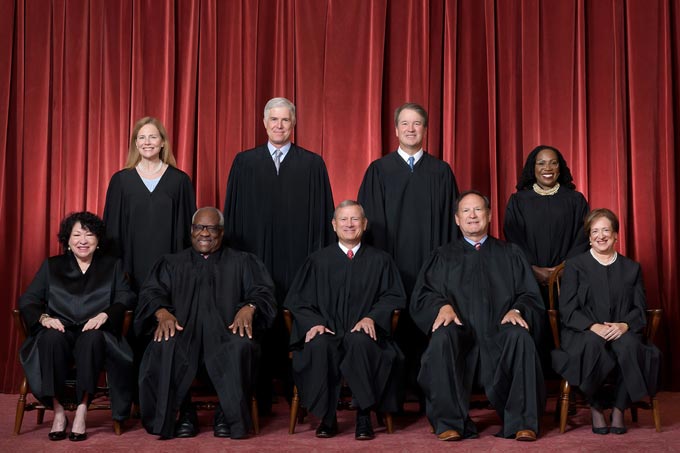
The Supreme Court as composed June 30, 2022 to present.
Front row, left to right: Associate Justice Sonia Sotomayor, Associate Justice Clarence Thomas, Chief Justice John G. Roberts, Jr., Associate Justice Samuel A. Alito, Jr., and Associate Justice Elena Kagan.
Back row, left to right: Associate Justice Amy Coney Barrett, Associate Justice Neil M. Gorsuch, Associate Justice Brett M. Kavanaugh, and Associate Justice Ketanji Brown Jackson.
Credit: Fred Schilling, Collection of the Supreme Court of the United States
June 27, 2025 - OAKLAND – California Attorney General Rob Bonta today issued the following statement on the U.S. Supreme Court’s decision remanding consideration of the nationwide injunction to the lower courts in California and other states’ lawsuit challenging President Donald Trump’s unlawful executive order seeking to end the constitutional right to birthright citizenship. Less than 24 hours after the order was signed, Attorney General Bonta co-led a multistate coalition in suing President Trump, arguing that the President’s attempt to unilaterally end birthright citizenship violates the Fourteenth Amendment of the U.S. Constitution and Section 1401 of the Immigration and Nationality Act and should be immediately blocked from going into effect while litigation proceeds. In its decision, the Supreme Court announced a new standard for nationwide injunctions, sending consideration of the scope of the injunction back to the lower courts. The decision states that the executive order cannot go into effect for 30 days.
“The rights guaranteed by the U.S. Constitution belong to everyone in this country, not just those whose state attorneys general had the courage to stand up to this President’s anti-democratic agenda,” said Attorney General Bonta. “The Supreme Court’s decision allows the lower courts to further consider the scope of the district court's nationwide injunction — which we believe is clearly necessary to provide full relief to the states. We remain hopeful that the courts will see that a patchwork of injunctions is unworkable, creating administrative chaos for California and others and harm to countless families across our country. The fight is far from over, and we will continue working to ensure this unlawful, anti-democratic executive order never has the chance to be implemented.”
BACKGROUND
From the beginning of our nation’s history, America followed the common law tradition that those born on U.S. soil are subject to its laws and are citizens by birth. Although the Supreme Court’s notorious decision in Dred Scott denied birthright citizenship to the descendants of enslaved people, the post-Civil War United States adopted the Fourteenth Amendment to protect citizenship for children born in the country. The Fourteenth Amendment’s Citizenship Clause explicitly promises that “[a]ll persons born or naturalized in the United States, and subject to the jurisdiction thereof, are citizens of the United States and of the State wherein they reside.”
The U.S. Supreme Court affirmed this constitutional right in 1898 when a San Francisco-born, Chinese American man was denied entry back into the U.S. after visiting relatives in China on the grounds that he was not a citizen. In United States v. Wong Kim Ark, the Supreme Court established that children born in the U.S., including those born to immigrants, could not be denied citizenship.
Within hours of taking office, President Trump issued an executive order disregarding the U.S. Constitution and this long-established precedent. The order directs federal agencies to prospectively deny the citizenship rights of American-born children whose parents are not lawful permanent residents or U.S. citizens. The order instructs the Social Security Administration and Department of State, respectively, to cease issuing social security numbers and U.S. passports to these children, and directs all federal agencies to treat these children as ineligible for any privilege, right, or benefit that is reserved by law to individuals who are U.S. citizens.
If allowed to stand, the order would strip tens of thousands of children born each year of their ability to fully and fairly be a part of American society as rightful citizens, with all the benefits and privileges. These children would lose their most basic rights and be forced to live under the threat of deportation. They would lose eligibility for a wide range of federal benefits programs. They would lose their ability obtain a Social Security number and, as they age, to work lawfully. And they would lose their right to vote, serve on juries, and run for certain offices.
The executive order would also directly harm California and other states, causing them to risk federal funding for vital programs that they administer, such as Medicaid and the Children’s Health Insurance Program; these programs are conditioned on the citizenship and immigration status of the children they serve. In addition, states would be required — on little notice and at considerable expense — to begin modifying their operation and administration of benefits programs to account for this change.
A copy of the court’s opinion is available here.
Source: CA. DOJ



